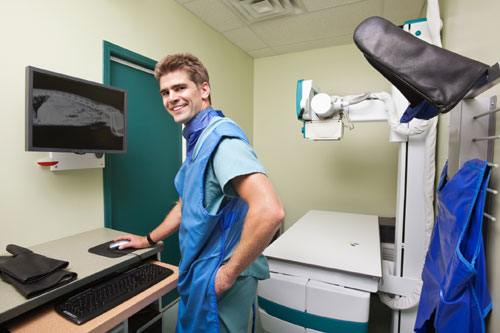Radiologic Technologist Career
 Radiology technologists or radiologic technicians, take x-rays, films, and perform computed tomography (CT) scans. They work in a variety of settings, including hospitals, doctors offices, dental offices, or imaging centers.
Radiology technologists or radiologic technicians, take x-rays, films, and perform computed tomography (CT) scans. They work in a variety of settings, including hospitals, doctors offices, dental offices, or imaging centers.
A radiology technician’s job is to take the x-ray or scan, so they need to be familiar with how to use the equipment, know what they are looking for, and be able to help the patient throughout the process, as some may not be able to move on their own.
Many people who consider entering the radiology technician career field have hesitations because of the radiation exposure. However, you should not let this prevent you from entering this field, as there are things that can be done to minimize the exposure, and these practices are taught and practiced on a regular basis. The radiation exposure is limited so that there is not a risk for you or enough to keep you from entering the career field.
Radiologic Technologist Career Snapshot
Radiology technicians often work in a hospital setting, although many today are working in imaging centers and dentist offices. They typically work 40 hours per week and need to be on their feet for long periods at a time. They also need to be able to help the patients if they are unable to move into the correct position on their own.
Further details on a career as a radiologic technologist are listed below (statistics from the May 2015 Bureau of Labor Statistics and Onet Online):
is the average yearly pay for radiologic technologists.
increase in employment between 2014 and 2024.
have an Associate’s degree while 24% have a post-secondary certificate.
Radiologic Technologist Job Outlook
The job outlook for radiologic technicians is expected to grow at a rate of 9% through 2024 which is faster than the average of all occupations. This is due in part to the aging population.
Radiologic Technologist Job Duties
Radiology technicians assist patients getting radiology procedures; including x-rays, CT scans, and films. They may need to help move their body into the correct position, explain the procedure to the patient, or even assist them in removing jewelry before beginning the procedure. They also position the equipment correctly in order to radiograph the right area of the body. In addition, they take any necessary safety precautions to prevent unnecessary exposure to the radiation. To do this, they use lead shields, aprons, and badges. This is done both for the patient and the radiology technician, whenever possible.
Radiologic Technologist Salaries
The average salary of a radiology technician, according to the Bureau of Labor Statistics was $56,670 per year in May 2015, making it an above average salary. The average yearly salary for radiology technicians ranges from around $38,000 to $81,000. Obviously, those with more experience and education and who specialize would likely be at the upper end of the pay range.
Radiologic Technologist Education
If you’d like to become a radiologic technician, you will need to attend a special program in addition to becoming licensed in many states. Most x-ray technicians have an Associate’s degree in radiology, however it is also possible to gain a Bachelor’s degree, or a certificate in radiology. You can pursue certification from the American Registry of Radiologic Technicians.
Radiologic Technologist Skills & Traits
| Radiologic Technologist Skill Set: | Required Abilities: | Tools Used by Radiologic Technologists: | Typical Work Activities: |
|---|---|---|---|
| • Active Listening • Speaking • Reading Comprehension • Social Perceptiveness • Writing | • Oral Comprehension • Oral Expression • Problem Sensitivity • Written Comprehension • Deductive Reasoning | • Hypodermic needle • Medical radiological positioning aids • Medical x ray darkroom equipment • Medical x ray intensifying screens | • Caring for others • Working directly with the public • Getting information • Using relevant knowledge • Communicating with others |
Related Careers
Diagnostic Medical Sonographers
Associate’s Degree
Nuclear Medicine Technologists
Associate’s Degree
Radiation Therapists
Associate’s Degree


